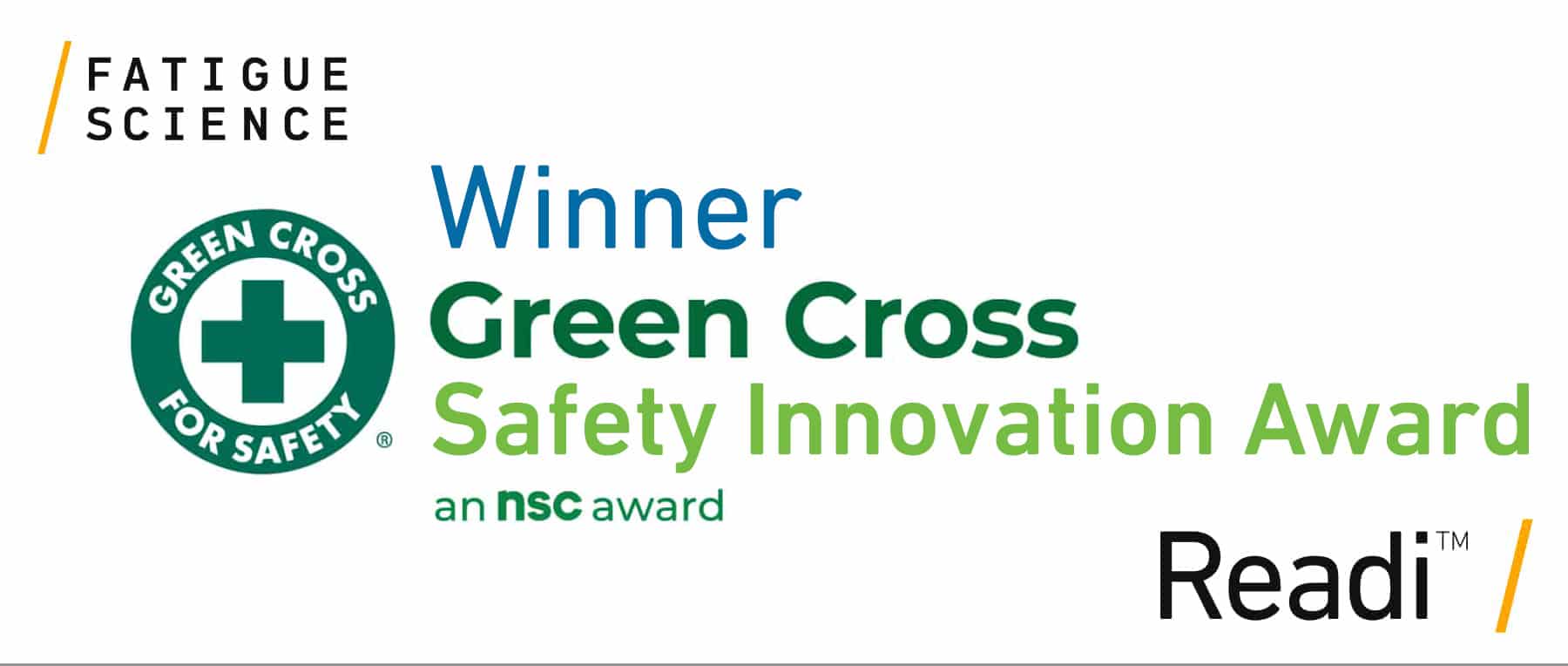Fatigue Science Wins Green Cross Safety Innovation Award
The National Safety Council announced Fatigue Science wins its prestigious Green Cross Award for Safety Innovation.
Worker fatigue is a costly and deadly problem, and a major concern in mining and other heavy industry sectors. While reactive technologies can detect when an operator is about to fall asleep, they require a company to halt operations. Fatigue Science’s Readi FMIS, the world’s leading predictive fatigue technology, helps solve that problem, promoting productivity while keeping employees safe.
Using Machine Learning and optional wearable technology, Readi analyzes workers’ sleep patterns to predict their fatigue levels. Supervisors receive daily predictions for each employee, which they can use to assign tasks based on fatigue levels. Operators also receive information on their sleep patterns, which they have used to improve their sleep habits. Readi has had a significant impact on both worker safety and business’ bottom lines, reducing fatigue-related incidents at two mines by an estimated 26% and improving output by $6 million per year.
Fatigue Science, the global leader in predictive fatigue analytics for mining, transportation and heavy industry, is once again recognized for pioneering a new best practice for safety in mining and heavy industry. “Predictive fatigue management” refers to leveraging fatigue management technology to reduce risk and increase productivity before the start of every shift. Thanks to Fatigue Science’s widespread deployment of its Readi FMIS platform, the practice has now become a well-established discipline.
With Readi FMIS, Fatigue Science has digitized and automated proactive fatigue management processes, with the effect of simplifying and improving the way shifts are managed every day. Dozens of major mine sites and industrial operations, including from many of the world’s top mining firms such as Newmont, Rio Tinto, and Glencore, have now adopted the technology. Other sectors, such as transportation and construction, are taking notice as well and have begun to adopt similar practices in their operations.
“It is a great honor to be recognized by the National Safety Council’s Green Cross Safety Innovation Award for our work in reducing individual operator fatigue risk every day. This risk is the single greatest cause of accidents, incidents, and lost productivity in heavy industry and transportation,” said Andrew Morden, President and CEO of Fatigue Science.
“NSC’s Green Cross Safety Innovation Award is validation of our team’s dedication and tireless work living up to our corporate mission of enabling safer and more productive working hours. Moreover, the award is a testament to the vision of our clients, who have for several years helped to pioneer the practice of Predictive Fatigue Management alongside us. We thank the NSC for their work in highlighting the importance of fatigue as a critical factor for industrial firms worldwide,” adds Robert Higdon, Senior VP of Product & Marketing at Fatigue Science.
“National Safety Council award winners don’t just aim to check off a box for safety. These leaders understand that they must prioritize safety at every level of decision making. We are proud to honor each of our nominees and our incredible winners, all of whom are committed to working alongside NSC to save lives, from the workplace to anyplace.” said Lorraine Martin, President and CEO of the National Safety Council.
The National Safety Council is America’s leading nonprofit safety advocate – and has been for over 100 years. As a mission-based organization, we work to eliminate the leading causes of preventable death and injury, focusing our efforts on the workplace, roadway and impairment. We create a culture of safety to not only keep people safer at work, but also beyond the workplace so they can live their fullest lives.
To find out more about Readi FMIS and how it can reduce risk and increase productivity in your operation, speak to one of our Fatigue Experts today.
or download our free eBook on the Science of Sleep for industrial workforces
